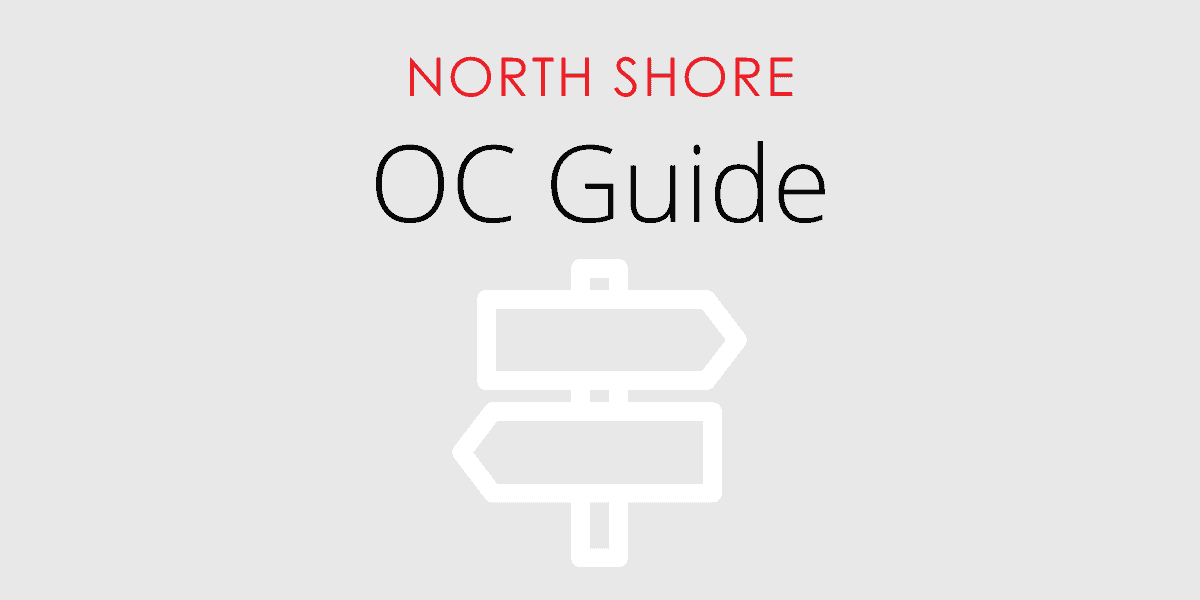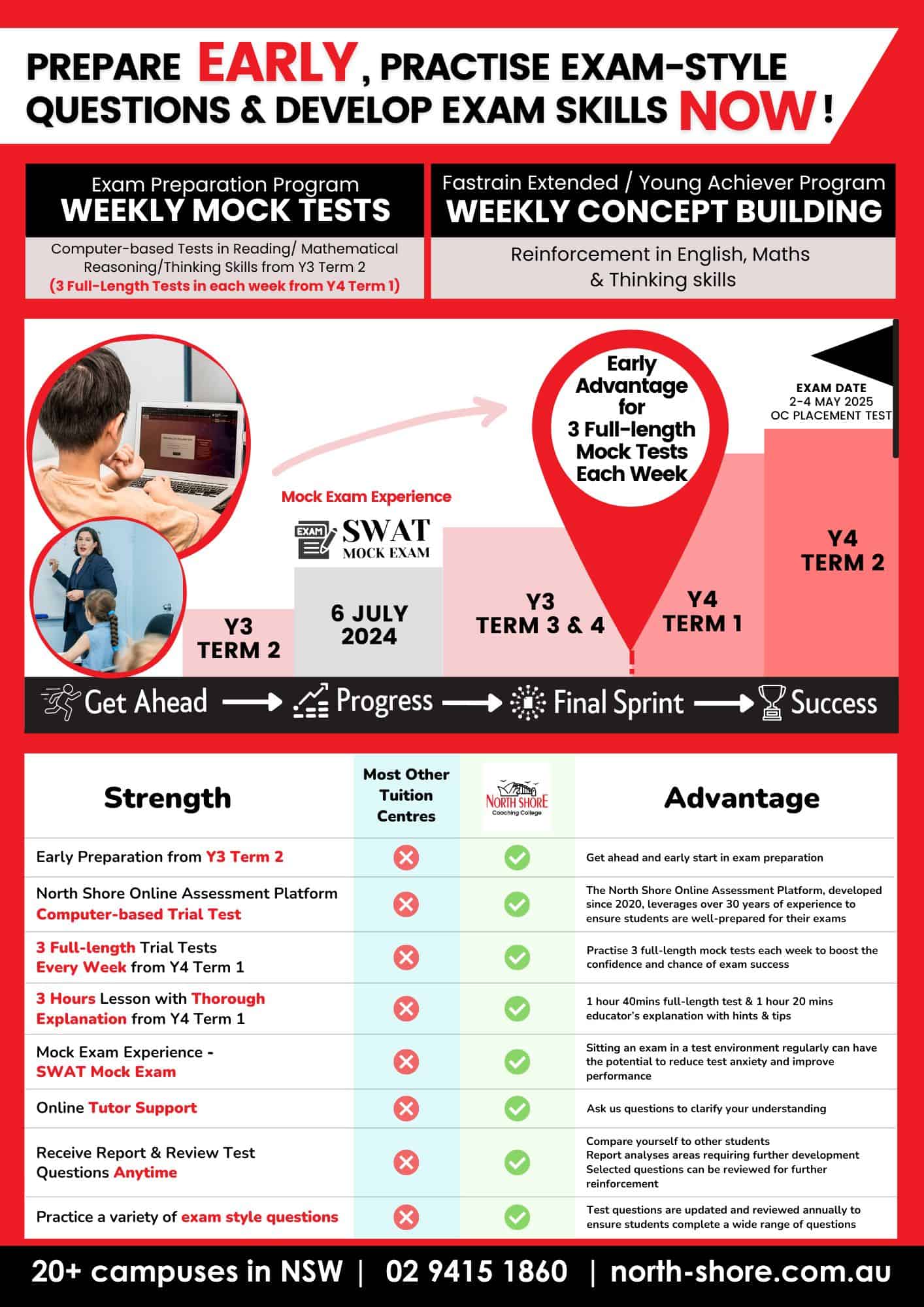[NSW] The Comprehensive Guide to Opportunity Class (OC) Schools
Changes to the application process for 2026 entry
From 2025, the placement tests for opportunity classes will move from single version paper-based tests to computer-based tests.
There will also be changes to the application process for 2026 entry to opportunity classes.
These changes will result in:
- a more engaging experience for students with computer-based testing
- a longer application period for parents and carers to apply
- more choice for parents and carers of when their child will sit a placement test
- outcomes being released earlier to parents and carers.
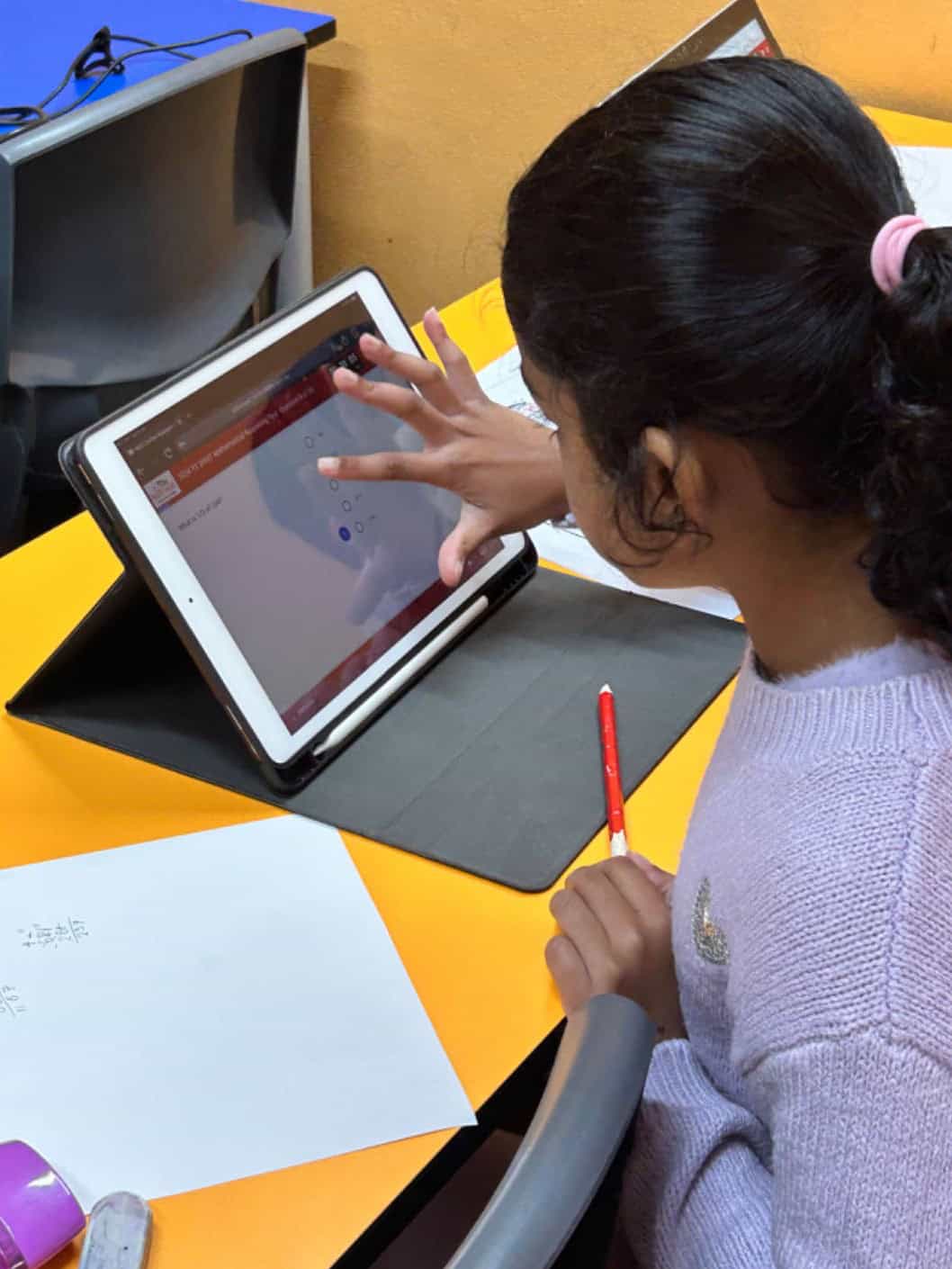
Computer-based tests in 2025
The placement tests in 2025 will be held at scheduled times over multiple days (Friday, Saturday, Sunday) and conducted mostly in external test centres (i.e. not in schools). Students will be allocated an external test centre within the local area of their current school.
The 2025 opportunity class placement test dates are 2-4 May 2025.
A make-up test date will be available for students who were unable to sit the initial test and who have an approved illness or misadventure request. The make-up test date in 2025 is Monday 19 May 2025.
There will be multiple versions of the computer-based test to allow the tests to be conducted over several days. Students will not need to bring their own device to sit the placement tests.
The test structure is not changing in 2025:
- The Opportunity Class Placement Test will continue to have 3 sections (Reading, Mathematical reasoning and Thinking skills).
- Parents and carers will be able to request reasonable adjustments for students with disability, medical conditions or temporary injuries to access the test.
- Before the test, students will be given a test admission ticket (previously called a Test Authority Letter). Students must bring their test admission ticket with them to the test.
Test outcomes
Outcomes and placement offers for opportunity class entry in 2026 will be available to parents and carers and schools in Term 3, 2025. The placement test Performance report will remain the same and continue to show how a student performed within performance bands.
Parents and carers will continue to be offered a place based on their child’s test performance and the order of their school choices. Test scores or placement ranks will still not be available or provided.
Applying for entry
Applications will be open each year from November to February (the following year) for opportunity class placement. Parents and carers will still apply online using the opportunity class placement application website.
Applications for opportunity class entry in 2026 will be open from 7 November 2024 to 21 February 2025. As there will now be a longer application period, the late application period will be replaced with a special consideration process. This is due to the application closing date being closer to the test dates and logistical constraints around organising test centres and devices.
This change to the application period means that parents and carers will now need to apply for opportunity class placement when their child is in Year 3 (or by the end of Week 4, Term 1 when their child is in Year 4). This change applies to students currently in Year 3.
Key dates – applying for entry in 2026
- 7 November 2024 to 21 February 2025 – parents and carers apply for opportunity class entry in 2026.
- 2-4 May 2025 – students sit the opportunity class placement test for entry in 2026.
- 19 May 2025 – make up test date (approved illness/misadventure requests)
- Term 3, 2025 – placement outcomes and offers released to parents and carers
- Term 1, 2026 – students who gain entry begin attending their opportunity class
Future placement test dates
| Year | Main test period | Make-up test |
|---|---|---|
| 2025 | Friday 2 May to Sunday 4 May 2025 | Monday 19 May 2025 |
| 2026 | Friday 1 May to Sunday 3 May 2026 | Friday 15 May 2026 |
| 2027 | Friday 30 April to Sunday 2 May 2027 | Friday 14 May 2027 |
| 2028 | Friday 5 May to Sunday 7 May 2028 | Friday 19 May 2028 |
How many students will be in these opportunity classes in 2026?
From 2026, the Department of Education expects more Year 5/6 composite opportunity classes of 30 students.
Schools with 30 students in each year group are expected to have 1 class per year group.
Year 5 entry in 2026
The Opportunity Class Placement Test will be held on 2-4 May 2025.
While Opportunity Classes have been around for a while, there have been several major changes in the past few years. North Shore Coaching College, the expert in OC Exam Preparation courses and mock tests, has compiled this comprehensive guide to the OC test and application process, with all the important, up-to-date information you need here on one page.
What are Opportunity Classes (OC)?
Opportunity Classes are located in government primary schools and cater for academically gifted Year 5 and Year 6 students with high potential. These classes help students to learn by grouping them with students of similar ability, using specialised teaching methods and educational materials at the appropriate level.
Parents normally apply when students are in Year 4. Students who are placed then attend the opportunity class full time in Years 5 and 6 at the primary school with an opportunity class. It is a two-year placement program. In the majority of cases, students who accept a place in an opportunity class will leave their current school to attend the school with an opportunity class.
There are 1840 places available in Year 5 opportunity classes across NSW in 2025.
- See a list of NSW primary schools with opportunity classes.
Read more: Official NSW Department of Education Website
Should I consider OC for my child?

There are a number of factors you should consider in deciding whether to enrol your child in an Opportunity Class, such as:
- Giftedness
- Eligibility
- Changing schools
- Teaching & curriculum
- Peers
Is my child gifted?
Opportunity Classes are designed to provide enhanced learning opportunities for high potential and gifted students, i.e. those with very high to extremely high academic merit (in the top 9% of their cohort).
High potential and gifted learners may demonstrate curiosity, fast-paced ease of learning, intense concentration in new learning or areas of interest, a sophisticated sense of humour, creative and critical thinking skills, high expectations, and other intellectual, creative and socio-emotional characteristics.
Read more: High Potential and Gifted Students | NSW Department of Education
Eligibility
Students are usually in Year 4 at the time of applying and when sitting the test. They are aged between 9 years and 5 months and 11 years at the time they start Year 5.
A student’s family must be living in NSW by the beginning of the school year of entry.
A student must be an Australian citizen, a permanent resident of Australia or a New Zealand citizen to enrol in an Opportunity Class.
Read more: Information for Applicants | NSW Department of Education
Changing Schools
Entering an Opportunity Class often involves changing to schools that may be located quite far from your current school/home. Parents of students who are offered a place in an opportunity class cannot assume that younger or older siblings can also enrol as an out-of-area enrolment at that school. Parents should consider this when choosing opportunity classes.
Changing schools may also mean that your child needs to negotiate a new social and emotional environment for the last two years of their primary schooling, and this can be problematic for certain children.
If you have any concerns about applying to Opportunity Classes, we recommend speaking to your child’s current teacher(s).

Teaching & Curriculum
Mainstream classrooms that contain children of all abilities can pose challenges for those at either end of the academic spectrum, including gifted students, who can easily become bored and disengaged at regular schools.
The aim of an Opportunity Class is to provide very capable students with the chance to learn in an environment that suits their unique needs, with teachers who have experience and training in the area of gifted education.
The topics of work covered in an OC class are highly engaging as they allow students to work at their own level, study topics that are interesting to them and complete tasks that are suited to their ability. Students have the opportunity to accelerate and extend their learning. There is also a strong focus on learning through problem-solving.
Peers
OC classes give capable kids the chance to learn alongside peers who have similar, or even stronger, academic capabilities. The stimulating, well-resourced environment of an OC classroom offers these kids the chance to strive and learn from others whose perspective could enrich their own skills and may be a good educational setting for your child too.
Dr. Miraca Gross, Professor of Gifted Education at UNSW, says that confidence and well-being issues can occur when very bright children don’t have an opportunity to connect with other kids who share their expectations of friendship:
“Gifted children tend to reach the final stage of friendship expectations years ahead of average ability children, thus causing social isolation and the need for a true friend.”
Often the feeling of isolation that gifted children feel in a mainstream classroom is alleviated when they join an Opportunity Class as they finally have like-minded students to talk to. Socially, this can displace feelings of being different or isolated.
Read more: Why accept an OC offer? | Jewells Primary School
Which schools have Opportunity Classes?
Schools with 15 places have one composite opportunity class catering for Year 5 and Year 6 students. Fifteen new students are accepted in Year 5 each year, with fifteen students continuing in Year 6. There are 30 students in the class.
| School | Location | Number of Year 5 places in 2025 |
|---|---|---|
| ALEXANDRA PARK COMMUNITY SCHOOL | Park Rd, Alexandria | 30 |
| ALSTONVILLE PUBLIC SCHOOL | Main St, Alstonville | 15 |
| ARMIDALE CITY PUBLIC SCHOOL | Faulkner St, Armidale | 15 |
| ARTARMON PUBLIC SCHOOL | McMillan Rd, Artarmon | 30 |
| ASHFIELD PUBLIC SCHOOL | Liverpool Rd, Ashfield | 30 |
| AURORA COLLEGE | Rural and remote, virtual opportunity class | 100◊ |
| BALGOWLAH HEIGHTS PUBLIC SCHOOL | Lewis St, Balgowlah | 15 |
| BALMAIN PUBLIC SCHOOL | Eaton St, Balmain | 30 |
| BATHURST WEST PUBLIC SCHOOL | Suttor St, Bathurst | 15 |
| BEECROFT PUBLIC SCHOOL | Beecroft Rd, Beecroft | 30 |
| BIRABAN PUBLIC SCHOOL | Beckley St, Toronto | 15 |
| BLACKTOWN SOUTH PUBLIC SCHOOL | Flushcombe Rd, Blacktown | 15 |
| BLACKTOWN WEST PUBLIC SCHOOL | Lancaster Street, Blacktown | 15 |
| BLAXCELL STREET PUBLIC SCHOOL | Blaxcell St, Granville | 30 |
| BLAXLAND EAST PUBLIC SCHOOL | Old Bathurst Road, Blaxland East | 30 |
| BRADBURY PUBLIC SCHOOL | Jacaranda Ave, Bradbury | 15 |
| BROOKVALE PUBLIC SCHOOL | Old Pittwater Road, Brookvale | 15 |
| CAMDEN SOUTH PUBLIC SCHOOL | Old Hume Hwy, Camden | 15 |
| CARINGBAH NORTH PUBLIC SCHOOL | Cawarra Rd, Caringbah | 15 |
| CASULA PUBLIC SCHOOL | De Meyrick Ave, Casula | 15 |
| CESSNOCK WEST PUBLIC SCHOOL | Cnr Campbell Street and Wollombi Rd, Cessnock | 15 |
| CHATSWOOD PUBLIC SCHOOL | Centennial Ave, Chatswood | 30 |
| COLYTON PUBLIC SCHOOL | Nelson St, Mount Druitt | 15 |
| COONABARABRAN PUBLIC SCHOOL | Newell Hwy, Coonabarabran | 15 |
| CUDGEGONG VALLEY PUBLIC SCHOOL | Madeira Rd, Mudgee | 15 |
| DUBBO WEST PUBLIC SCHOOL | East St, Dubbo | 15 |
| DURAL PUBLIC SCHOOL | Old Northern Rd, Dural | 30 |
| EARLWOOD PUBLIC SCHOOL | Homer St, Earlwood | 30 |
| ERMINGTON PUBLIC SCHOOL | Winbourne St, West Ryde | 30 |
| GEORGES HALL PUBLIC SCHOOL | Pennington Ave, Georges Hall | 15 |
| GLENBROOK PUBLIC SCHOOL | Woodville St, Glenbrook | Not available in 2025 |
| GOONELLABAH PUBLIC SCHOOL | Ballina Rd, Goonellabah | 15 |
| GOSFORD PUBLIC SCHOOL | Faunce St West, West Gosford | 30 |
| GOULBURN WEST PUBLIC SCHOOL | Combermere St, Goulburn | 15 |
| GREENACRE PUBLIC SCHOOL | Waterloo Rd, Greenacre | 15 |
| GREYSTANES PUBLIC SCHOOL | Merrylands Rd, Greystanes | 30 |
| HARRINGTON STREET PUBLIC SCHOOL | Harrington St, Cabramatta | 15 |
| HOLSWORTHY PUBLIC SCHOOL | Infantry Pde, Holsworthy | 15 |
| HURSTVILLE PUBLIC SCHOOL | Forest Rd, Hurstville | 60 |
| ILLAROO ROAD PUBLIC SCHOOL | Illaroo Rd, Nowra | 15 |
| IRONBARK RIDGE PUBLIC SCHOOL | Ironbark Ridge Rd, Rouse Hill | 30 |
| JEWELLS PRIMARY SCHOOL | Lepton Pde, Jewells | 15 |
| KINGSWOOD PUBLIC SCHOOL | Second Ave, Kingswood | 15 |
| LEUMEAH PUBLIC SCHOOL | Burrendong Rd, Leumeah | 15 |
| LINDFIELD EAST PUBLIC SCHOOL | 90 Tryon Road, East Lindfield | 15 |
| LITHGOW PUBLIC SCHOOL | Mort St, Lithgow | 15 |
| MAROUBRA JUNCTION PUBLIC SCHOOL | Storey Street, Maroubra | 15 |
| MARYLAND PUBLIC SCHOOL | John T Bell Dr, Maryland, Newcastle | 15 |
| MATTHEW PEARCE PUBLIC SCHOOL | Astoria Park Rd, Baulkham Hills | 30 |
| MIRANDA PUBLIC SCHOOL | 3 Sylva Avenue, Miranda | 15 |
| MONA VALE PUBLIC SCHOOL | Waratah St, Mona Vale | 30 |
| MOREE PUBLIC SCHOOL | Albert St, Moree | 15 |
| MOSS VALE PUBLIC SCHOOL | Browley Street, Moss Vale | 15 |
| NEUTRAL BAY PUBLIC SCHOOL | Ben Boyd Rd, Neutral Bay | 30 |
| NEWBRIDGE HEIGHTS PUBLIC SCHOOL | Lewin & Magree Cres, Chipping Norton | 15 |
| NEW LAMBTON SOUTH PUBLIC SCHOOL | St James Rd, New Lambton | 15 |
| NORTH ROCKS PUBLIC SCHOOL | North Rocks Rd, North Rocks | 30 |
| PENRITH PUBLIC SCHOOL | Corner High Street & Doonmore Street, Penrith | 15 |
| PICNIC POINT PUBLIC SCHOOL | Thomas St, Picnic Point | 15 |
| PORT MACQUARIE PUBLIC SCHOOL | Grant St, Port Macquarie | 15 |
| QUAKERS HILL PUBLIC SCHOOL | Medlow Dr, Quakers Hill | 30 |
| QUEANBEYAN SOUTH PUBLIC SCHOOL | Cameron Rd, Queanbeyan | 15 |
| RICHMOND PUBLIC SCHOOL | Windsor St, Richmond | 30 |
| RUTHERFORD PUBLIC SCHOOL | Weblands St, Rutherford | 15 |
| RYDE PUBLIC SCHOOL | Pope St, Ryde | 30 |
| SMITHFIELD PUBLIC SCHOOL | O’Connell St, Smithfield | 15 |
| SOLDIERS POINT PUBLIC SCHOOL | Cromarty Rd, Soldiers Point | 15 |
| SOUTH GRAFTON PUBLIC SCHOOL | Vere St, South Grafton | 15 |
| ST ANDREWS PUBLIC SCHOOL | Ballantrae Dr, St Andrews | 15 |
| ST CLAIR PUBLIC SCHOOL | 4 Timesweep Drive, St Clair | 15 |
| ST JOHNS PARK PUBLIC SCHOOL | Sandringham St, St Johns Park | 15 |
| STURT PUBLIC SCHOOL | White Ave, Wagga Wagga | 15 |
| SUMMER HILL PUBLIC SCHOOL | Moonbie St, Summer Hill | 30 |
| SUTHERLAND PUBLIC SCHOOL | Eton St, Sutherland | 30 |
| TAHMOOR PUBLIC SCHOOL | Bronzewing St, Tahmoor | 15 |
| TAMWORTH PUBLIC SCHOOL | Napier St, Tamworth | 15 |
| TAMWORTH SOUTH PUBLIC SCHOOL | Petra Ave, Tamworth | 15 |
| TIGHES HILL PUBLIC SCHOOL | Elizabeth St, Tighes Hill | 15 |
| TOONGABBIE PUBLIC SCHOOL | 59 Fitzwilliam Road, Toongabbie | 15 |
| TOORMINA PUBLIC SCHOOL | Cavanba Rd, Toormina | 15 |
| WAHROONGA PUBLIC SCHOOL | 71 Burns Road, Wahroonga | 15 |
| WAITARA PUBLIC SCHOOL | Edgeworth David Ave, Wahroonga | 30 |
| WENTWORTH FALLS PUBLIC SCHOOL | Falls Rd, Wentworth Falls | 15 |
| WILKINS PUBLIC SCHOOL | Park Rd, Marrickville | 30 |
| WOLLONGONG PUBLIC SCHOOL | Church St, Wollongong | 30 |
| WOOLLAHRA PUBLIC SCHOOL | Forth St, Woollahra | 30 |
| WYONG PUBLIC SCHOOL | Cutler Dr, Wyong | 30 |
Note:
◊ Only students who would be enrolled in Year 5 in an authorised host school in a rural remote area (excluding areas where there is a current opportunity class provision) may apply for Aurora College, the virtual opportunity class.
*Schools with 15 places have one composite opportunity class catering for Year 5 and Year 6 students. Fifteen new students are accepted in Year 5 each year, with fifteen students continuing in Year 6. There are 30 students in the class.
What is the OC selection process?
Entry into Opportunity Classes is decided on academic merit based on student performance in one placement test that typically occurs around late July each year.
To promote fair and equitable access for all high potential and gifted students, the Equity Placement Model helps to address unintended barriers to entry for students from low socio-educational advantage backgrounds, Aboriginal students, rural and remote students, and students with disabilities.
Learn more about the Equity Placement Model.
Where a student has missed the test for a valid reason, alternative evidence of academic merit will be used to rank the student. This rank will then be reviewed by the selection committee to make placement decisions.
Performance report
The Performance report shows how your child performed in comparison to the other students who took the test in that year.
For each of the test components, the report shows where your child performed in one of four bands:
- top 10% of candidates
- next 15% of candidates
- next 25% of candidates
- lowest 50% of candidates
Download a Performance report example [PDF, 240KB].
It is important to understand that the Performance report does not show the percentage of correct answers a child has achieved for any of the test components, but rather how many other students performed within the same range.
The Performance report does not provide an individual’s test scores or placement rank.
Test scores or placement rank are not available.
Read more: The Selection Process | NSW Department of Education
What is the OC Placement Test like?
The test in 2025 is computer-based. The test consists of 3 test components: Reading, Mathematical Reasoning, and Thinking Skills, in that order.
- Reading – 13 items (25 answers across 13 questions) – 30 minutes (33.3%)
- Mathematical Reasoning – 35 items – 40 minutes (33.3%)
- Thinking Skills – 30 items – 30 minutes (33.3%)
All questions are multiple-choice.
Reading Test
The reading test consists of 13 questions (2 have multiple parts to answer). Students have 30 minutes to complete the test. The questions are based on a diverse range of texts and assess a range of reading skills.
The reading test questions are based on different genres such as non-fiction, fiction, poetry, magazine articles and reports.
Mathematical Reasoning Test
The mathematical reasoning test consists of 35 questions. Students have 40 minutes to complete the test. The questions are all multiple-choice.
The mathematical reasoning test assesses the student’s ability to apply mathematical understanding and knowledge to problems, with questions drawn from a range of mathematical content areas. Calculators are not used.
Thinking Skills Test
The thinking skills test consists of 30 questions. Students have 30 minutes to complete the test. The questions are all multiple-choice.
The thinking skills test assesses the student’s ability in critical thinking and problem-solving. There is a range of different question types in the test.
Read more: The Test | NSW Department of Education
What happens after the test?
Placement Outcome Information
Placement outcome information is usually sent to parents by email and post at the start of October.
The placement outcome information advises that your child may be:
- offered a place at one school choice, or
- placed on the reserve list (waiting list) for one or both choices, or
- unsuccessful for one or both school choices, or a combination of two of the above.
If your child is made an offer to the school you selected as your first choice and also had a score high enough to be offered a place at your second choice school, the second choice school will be shown as ‘not applicable’.
Responding to an Offer
Responding to an offer is done via the application dashboard. Complete, sign and return the response form to the Team before the due date. You will usually need to respond within two weeks but if you get an offer by phone you may have to respond within 24 hours.
Reserve Lists
Opportunity Classes only have a limited number of places available each year. Each school may also have a reserve list in case students with initial offers withdraw. Applicants are given their reserve list position with their placement outcome advice.
The Team continues to make offers to students on reserve lists as vacancies occur throughout Year 5 and to at least the end of Term 1 in Year 6. For the 2024 entry, applicants whose children are on a reserve list only can be offered a place if their child’s position on the reserve list is reached until at least the end of Term 1, 2024.
When an applicant declines an offer of placement, the next student on a reserve list is offered their place. Students will receive an offer if their position on the reserve list is reached. Applicants must accept an offer by the advised due date or the offer will lapse.
- Students on reserve lists may not be offered a place.
- Students who have accepted an offer for the school they listed second may be placed on the reserve list for the school they listed first. If their reserve list position for that school is reached, they will receive another offer. If they accept the new offer to the school they listed first, the Team will consider the original offer declined.
- Reserve lists remain active throughout Years 5 and up to the end of Term 1 in Year 6.
Applicants who have accepted an offer for placement in an opportunity class, and are also on a reserve list for a higher choice school, will be removed from the reserve list. These applicants may remain on a reserve list for a higher choice only if they decline their offer by that date. However, there is no guarantee that the student would receive a further offer.
Enrolment
Schools will contact parents about enrolment procedures and orientation days.
All successful opportunity class students are sent an ‘Authority to attend’ letter in late January of the year of entry. This document confirms the student’s entitlement to enrol in an opportunity class. Students must present the letter to the school on the first day of Term 1 along with other original documents the school requires.
Read more: Placement Outcome Information | NSW Department of Education
How can I apply for OC?
To apply for Year 5 placement in the following year, Year 4 parents must submit an application and have their child sit the placement test.
For 2026 entry, the Opportunity Class Placement Test will be held on 2-4 May 2025.
Parents can choose up to two school choices, with the first one being the first preference.
Click here to read more about the application process.
How can I prepare my child for OC?
It’s never too early to start thinking about boosting your child’s academic journey, and it’s never too late to make a difference by supplementing their education with external coaching. That said, it’s generally more effective to work consistently over a longer period of time than (just) to prepare intensively in the lead-up to examinations. If you think your child would benefit from regular, personalised learning outside of school, weekly tuition might suit you.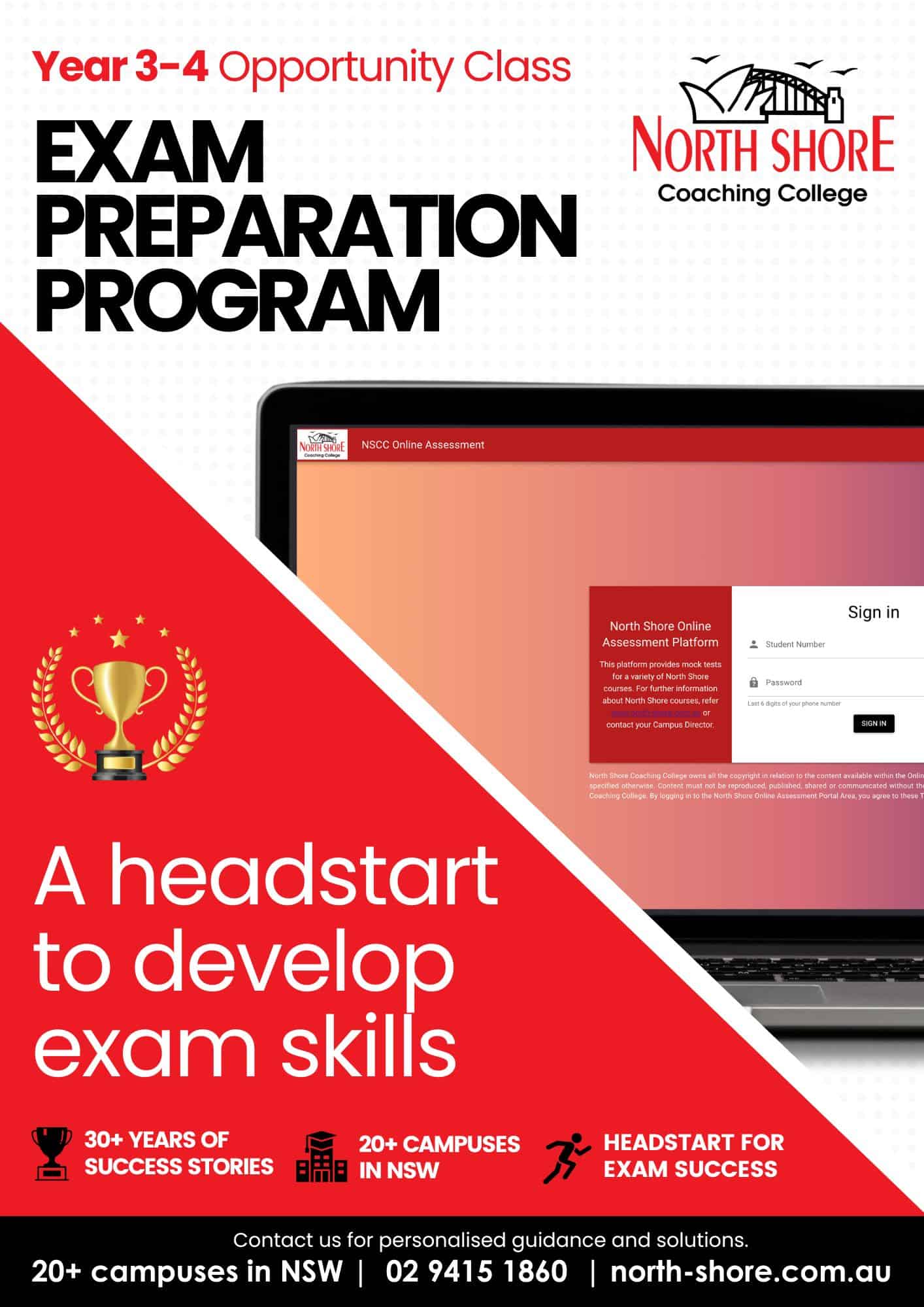
Exam Preparation Programs
In terms of the OC test specifically, around Year 3 is a good time to begin preparation, giving your child approximately a year to develop their knowledge and skills. In the highly competitive world of OC exams, it is important to be prepared for the OC test. A small number of sample tests are available from the official website, but the best way to prepare is through North Shore Coaching College’s Year 3 and Year 4 Fastrain Programs and OC Exam Preparation Program. We provide expertly developed courses focusing on Reading, Mathematical Reasoning and Thinking Skills (the three components of the OC test). Mock tests & review sessions are regularly provided as part of the Programs, as well as personalised homework help, and additional exam preparation workshops.
SWAT Mock Exam
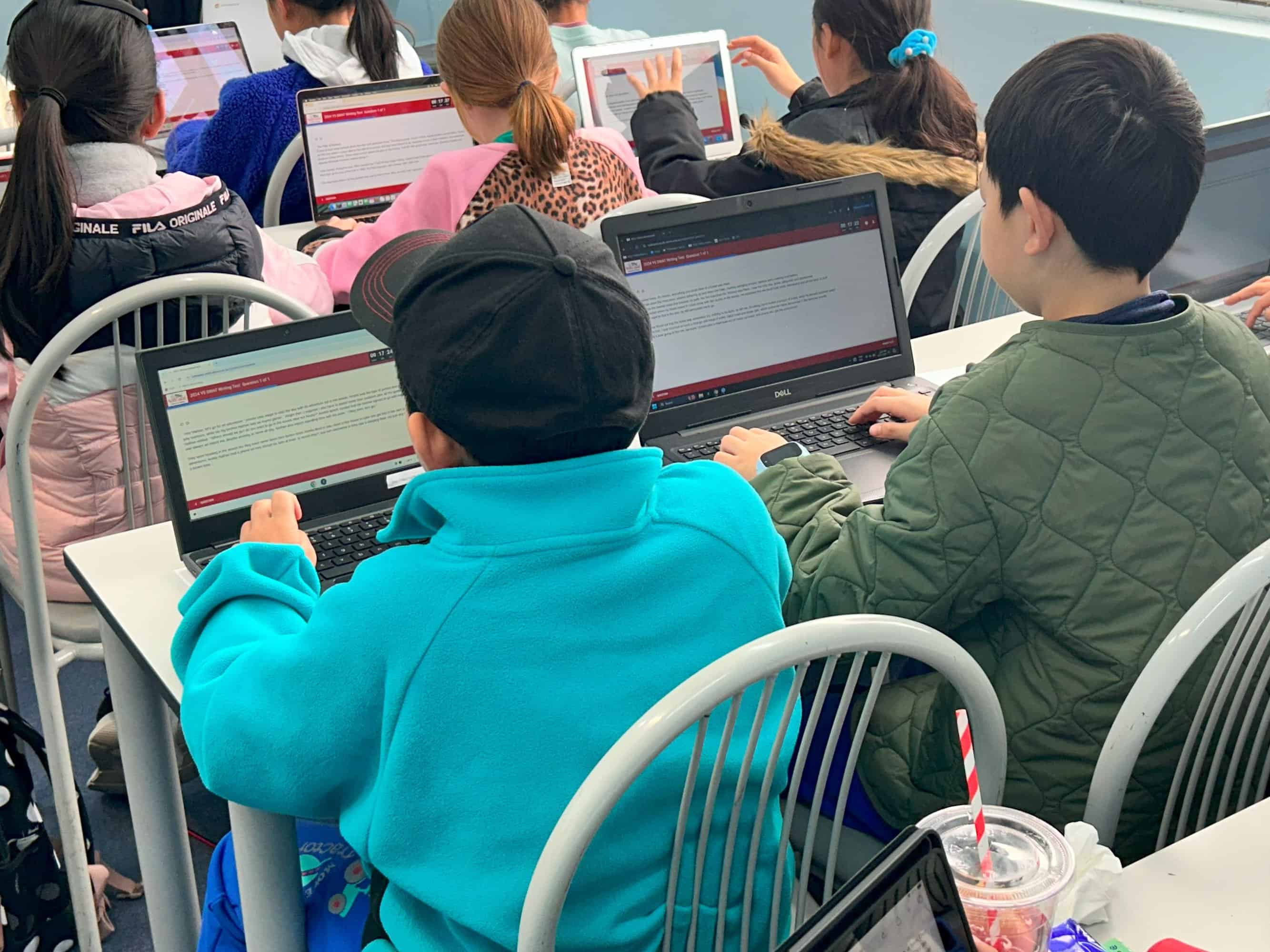 Through North Shore Coaching College’s over 30 years of educational experience, we have found that practising sitting an examination in a test environment reduces test anxiety and improves performance when it comes to any test. The annual SWAT MOCK EXAM is on Sat, 5 July 2025.
Through North Shore Coaching College’s over 30 years of educational experience, we have found that practising sitting an examination in a test environment reduces test anxiety and improves performance when it comes to any test. The annual SWAT MOCK EXAM is on Sat, 5 July 2025.
For Year 3 and Year 4 students, early testing and practice teaches how to manage time and deal with a wide range of vital question types and topics typically found in the OC test.
Register for SWAT now!

About North Shore Coaching College
North Shore Coaching College is Australasia’s leading institution specialising in coaching and tuition with over 65 campuses across Australia and Hong Kong. Established since 1991, we have been delivering high-quality, affordable educational services with no hidden costs for students from junior to high school. Our teaching methodology is optimised, with approximately two-thirds of the time spent teaching and the remaining for class practice and individual attention. This learning process encourages creativity, open discussion and lateral thinking. At North Shore, we also assist students to develop effective time management, self-motivation and self-direction in studies which increases discipline, confidence and communication skills. Our goal is to prepare your child to be ‘results-oriented’ with an exam-focused mind to succeed. Indeed, we have many proven success stories delivering “Tuition That Works”. Thousands of North Shore students achieve in winning school scholarships, gaining entry to selective high schools, and moving on to distinguish themselves at Australia’s most respected universities. Read more about the awards and success stories here.


